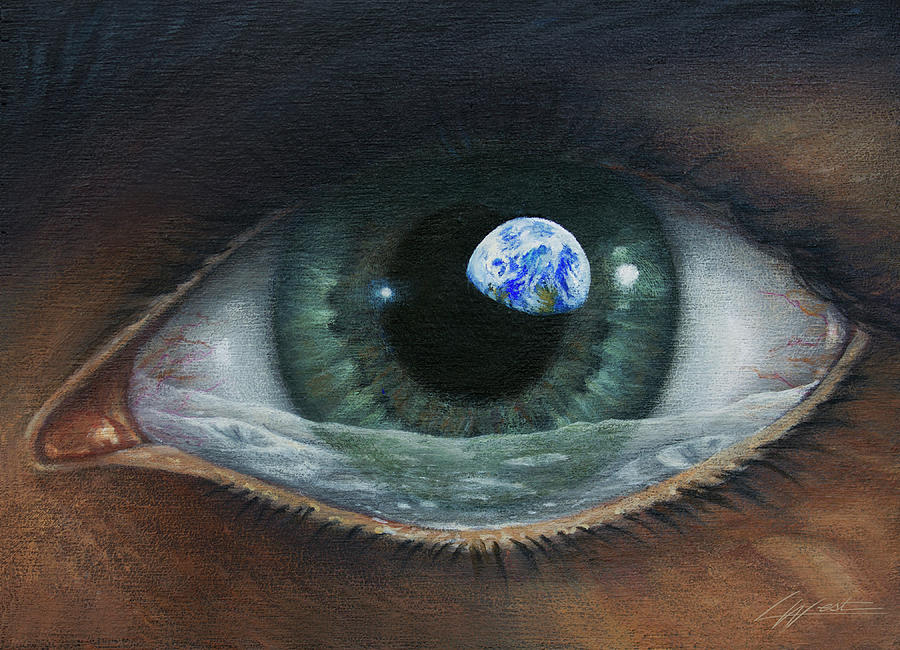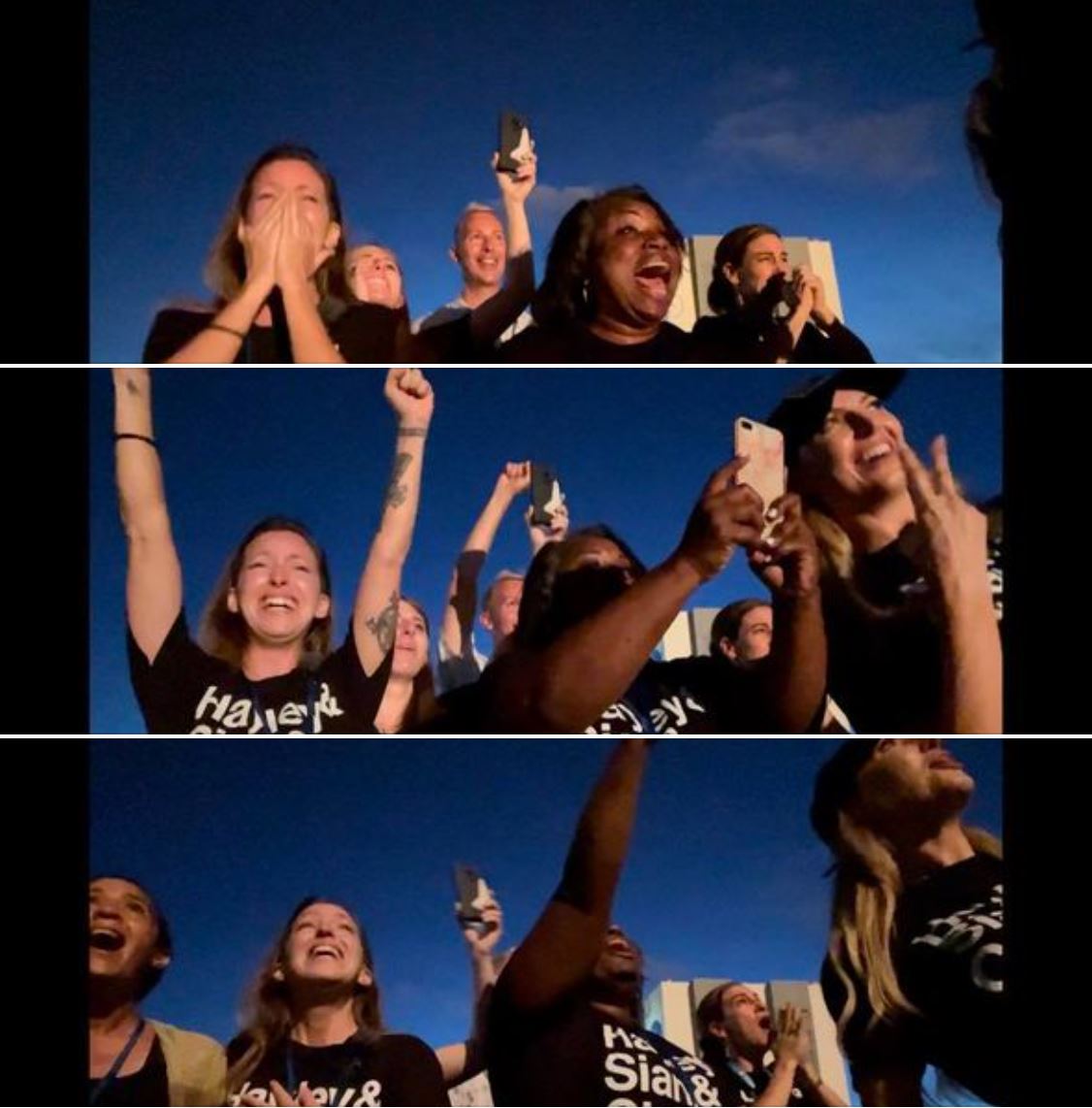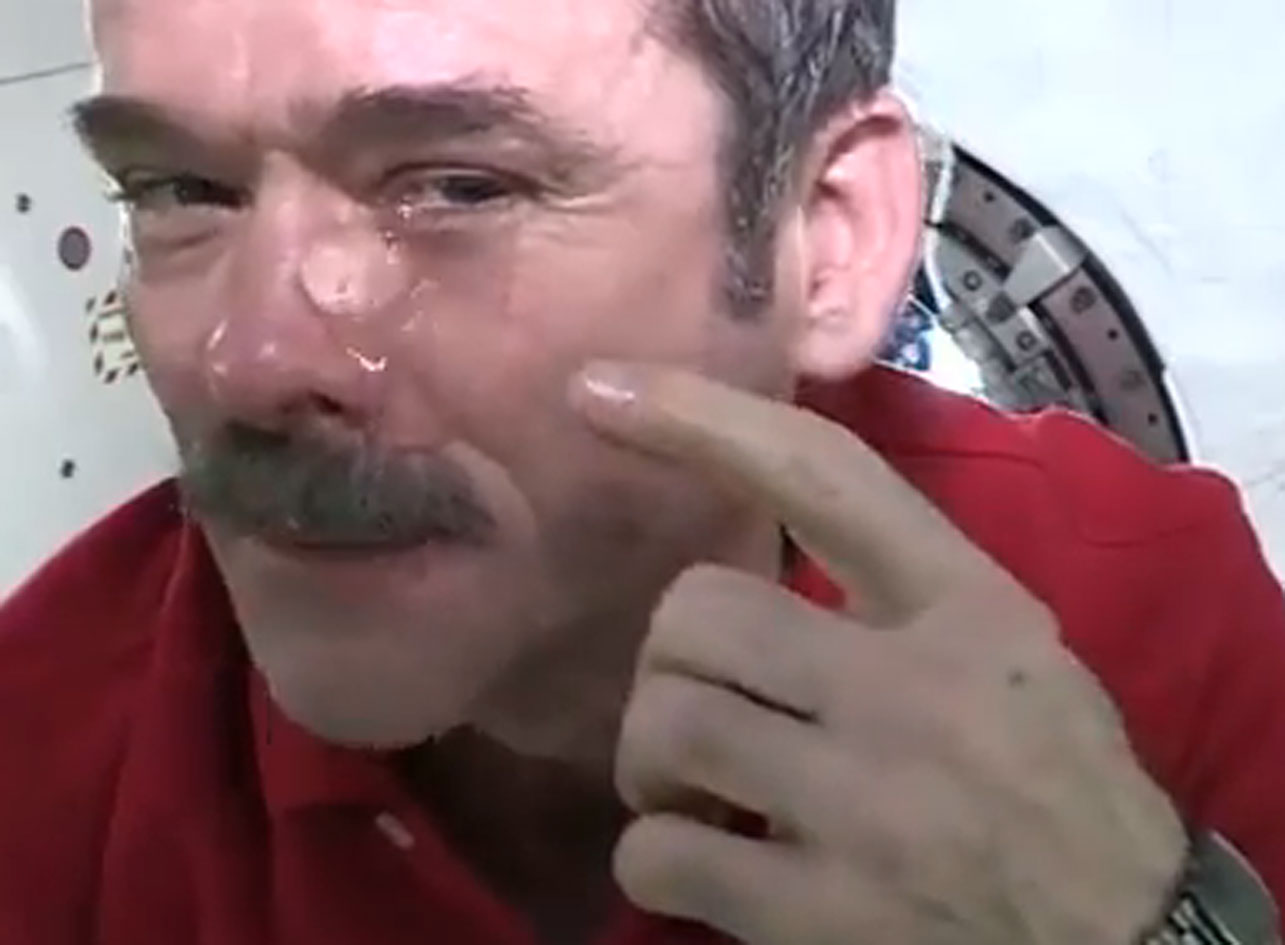As I am sure you know by now, I really let the events of my week pick out the loudest thing lesson that I had to learn to write about at the end of each week. And I know many of you probably thought I was going to talk about the Artemis I scrubs this week. But for some reason, that wasn't the loudest thing in my week, but I am sure we will be talking about that at some point soon. Summary for Artemis: space is hard. There ya go!
This week I am going to be talking about crying. It sounds a little strange but I am very passionate about crying. And if you don't know me personally yet - Hi, I am Bailey! I cry. A LOT. I cry when I am sad or frustrated or overwhelmed. I cry when I am in awe or feel extreme joy. I cry when I am speaking passionately or when I am opening myself up with words. I cry when others cry, oh man am I a sympathy crier. I cry far more frequently than... yeah pretty much anyone else I know. And not in a "depression" way (not all the time at least) but just in a "hey this is how I express myself" way. I will never forget two years ago or so when I cried on my Instagram live. I was trying to take the stereotypical social media path and going live every week (much like I am doing now) to discuss hard topics. I believe the live was specifically on Imposter Syndrome and I opened up about some thoughts I had about myself. I cried and I was so embarrassed and ashamed that I did that in front of everyone. But the response was of overwhelming support and empathy, even from my male followers. People understood the emotions behind my words. That helped me begin to turn away from the shame of crying, a process I am still working through.
First, let's dive into crying. Webster's dictionary defines crying as... no I am just kidding. But for real, we all know there are many scientific and evolutionary beneficial reasons for crying. Let's explore them.
- Eye Maintenance - Crying keeps your eyes clean and moist. That is why nobody, no matter how manly, can escape pepper spray without crying. I mean, it is called tear gas for a reason.
- Pain Management - Crying releases feel-good endorphins and oxytocin which is why you cry when you get hurt, have a headache or migraine, or feel pain like heartache.
- Communication within your Tribe - the reason babies cry is to alert others that something is wrong. Even as we get older and begin to use our words more eloquently, crying is still one of the fastest and most effective ways to communicate you are in distress, even if you can't put words to the exact issue itself.
- Improve Relationships - similar to the communication aspect, crying at its core is a very vulnerable thing to do. Sharing this type of vulnerability within your tribe is how you can grow and universally deepen relationships and trust.
- Self Expression - crying communicates a wide range of emotions, the most common being grief/sorrow, rage/frustration, and joy. When communicating such powerful and raw emotions, who is to say tears are not the best way for someone to express themselves?
So tears are not inherently good or bad. But I had a very hard time with my own tears growing up. Like I said, I cry a lot. Honestly, it feels like sometimes my eyes just leak, whether I want them to or not.

Painting by Lucy West named Discovering Earth
The classic Earthrise from Apollo 8 reflected in a human eye. After talking to West, she told me she did not intend for the lunar surface to appear as a tear welling up but to me, that is the most moving and relatable aspect when I see this.
The hardest thing about this growing up would probably be my involvement in martial arts. I am a third-degree black belt going on my 22nd year of practicing a wide range of styles. I received my first degree when I was 10 years old and my second degree when I was 14 years old. While I know I put in a high level of effort, especially for my age, I don't always feel I fully understood what it meant to be a black belt until I started prepping for my second-degree testing. This also means my formative pre-teen and teen years were spent as a black belt, for better or worse. I truly stepped into being a black belt and all that comes with it at about 13 or 14 years old, smack dab in the middle of puberty. In such a masculine and tough sport, I know this greatly impacted how I saw myself. I would cry a lot in taekwondo. During sparring if I got hit too hard or if I got frustrated with my opponent or myself. During class when I felt I was being yelled at unjustly. Sometimes just because, you know how the waves of teen hormones are. And every time, I felt greatly shamed by my instructor and classmates.
Of course, I don't blame them! That is not the purpose of my sharing this with you. And it was never openly discussed in that culture. No blame in that game here! But it explains the very deep shame I was conditioned to feel whenever I had strong emotions and how it has continued into my adult life. I remember being filled with so much rage that the boys in class could show anger by hitting each other harder, yelling louder, or other more "macho" signs of aggression but I could not express my anger in a way that felt natural to me, through crying.
My crying has been a very negative thing in friendships, past romantic relationships, and within the workplace. I have cried in office hours with professors, in my boss's office, in countless bathrooms at college or workplaces. And for so long, I got so upset with myself, every time thinking "black belts don't cry, big girls don't cry, powerful women don't cry..." and so on. Even my mom, bless her soul for trying to raise such an emotional child, played into that narrative. (Because I know she will read this - no blame Mom! I love you!) We would have candid and loving conversations about why I cried so much, a question my mom could never answer. It led me to feeling different, like something was wrong with me, and spending countless hours on google searching random and useless things like "overactive tear ducts" and "crying disease" in hopes there was a medical reason for this phenomenon.
I hid this for many years, every time kicking myself when I did slip up and cry during training - which oftentimes made me cry harder. Something changed in me when I was in college and came back to visit a class. There was a girl, maybe four or so years younger than me, who had joined when she was about seven. This girl was now navigating her own puberty hardship as a brilliant young woman. From the other side of the dojang (gym) I watched her get upset and I watched my instructor stand over her, chastizing her in a way that was all too familiar. I couldn't hear the words but I was very clear on what he was saying. I remember watching this play out like a movie, seeing myself in this young woman, and thinking for the first time with complete clarity "crying isn't wrong, it is just a different form of self-expression." And with that, I became very free. Free to cry. Free to feel. Free to care.
So in answer to my mom's concerned question "why do you cry so much?" It is because I FEEL so much. And with that, I am here to switch the narrative of crying. It is a powerful way to communicate deep emotions vulnerably and authentically. One of the best cries of my entire life was watching the Inspiration4 rocket take off with my friend and mentor Sian Proctor inside. The beauty that I was seeing visually, the rumble inside my chest, and the feeling that I know Sian was having inside my heart ripped through every known emotion I had in a video posted by MaryLiz Bender that you can see here.

Photos from MaryLiz Bender and Cosmic Perspective of our reaction to the Inspiration4 launch.
I also know that I personally tend to cry when I feel unheard. When I feel unheard, I get very frustrated and overwhelmed and that's when I start feeling the sting in the corners of my eyes. And that is a good warning sign to myself and others as to the emotions I am dealing with in conflict. It is a good reminder to take a step back and ground myself. To help with this, I am continuing to surround myself with people who are not afraid to watch me cry and don't take it as a personal attack against them. Having these types of people in my life, and training other loved ones of this such as my parents, has been a strong and healthy step toward a world that does not shame tears.
But that is not the society that we live in. It is actually why this lesson is what spoke to me so strongly this week. I got told that my emotions (aka my crying) are not beneficial in a professional setting and I needed to learn how to control them. I turned this piece of hard-to-swallow feedback rock over and over in my head until it became a smooth pebble. My emotions are strong and powerful and often come out in the form of tears, especially in things that I am passionate about like my work and my career. Where we are right now in society makes those types of emotions hard. Crying still makes the vast majority of people uncomfortable. My goal is never to make someone feel uncomfortable. Because of that, I am working on controlling my intense emotions that may lead to crying. Obviously, it is a slow process and I will still cry sometimes, hey I am not perfect! This "smooth pebble" of hard lessons from this week led me to a few realizations.
- I will work to control my emotions so that I cry only when it serves to unite people through vulnerability, not make them uncomfortable.
- I want to raise society's emotional literacy to eventually see crying as a vulnerable connection tool, not something to be feared or shamed. And it is okay that we are not there yet.
- I love my tears! They are my special form of self-expression of the amazing emotions I have inside me. And when I am done, my eyes often turn this amazing green and I feel like an Emerald Goddess of Emotions.
This is a very large piece of me that often goes very hidden and undiscussed. I want to acknowledge that I have the power to make others feel uncomfortable. I am sure we, as a growingly emotionally intelligent community, can see this uncomfortable feeling others may have is a reflection of them and their inability to face their emotions. But that still doesn't give me a right to force them to be uncomfortable and I will work to control my emotions to be used only to strengthen connections. There is another reason I want to work to control my crying better.
And of course, I have to tie this to space somehow!
In the microgravity environment that is space, water forms in balls due to surface tension being the only force acting on it. This means when you cry (however good the reason), your tears will form little balls of water around your eyes and blind you instead of running down your cheeks. This is shown by Astronaut Chris Hadfield in this amazing YouTube clip. You can actually even see this at work in the first few seconds of my Rubik's in ZeroG video. We were playing around with balls of water and, as you can see, one gets stuck to my check. From a media perspective, it looks like I was moved to tears, a great shot! But this is one of the rare moments in my life where I didn't actually cry! I think that was because so many other things were going on! But this is where my stance on crying (that is okay and you don't have to keep it in) has to have an amendment, for space safety. When I get to space, I need to be able to control my tears. If I were to cry when in a spacesuit or trying to do a mission-critical activity, I could put myself and others in danger if the tears pool up! That being said, you can bet I will be crying when I make it to space! I am sure watching my first sunrise, I will be moved to tears. I just will have the emotional control to do it at a safe and appropriate time where I can truly appreciate the little balls of tears that will come with the experience of crying in space.


Left: Chris Hadfield demonstrating tears in space (Credit: NASA)
Above: Bailey Burns (me!) with a drop of water on my face during my ZeroG flight (Credit: Rubik's)
Overall, I hope you take from this that crying is a beautiful form of connection and vulnerability. There are plenty of other emotional self-expression actions such as banging fists, yelling, jumping up and down with excitement, hugging, and so on that we, as society, have deemed as acceptable for intense emotions. If you see someone crying, take it as a form of self-expression of their emotions and stand in that moment with them, truly understanding their feelings. And don't be afraid to allow yourself to cry as a form of your own self-expression as well. It is a beautiful way for us to vulnerably connect.
This is a such an important and less spoken about aspect of human connections and expression. Crying is normal and in fact, not crying at the right moment is not good for health. Loved the behind the scenes aspect of Rubik’s cube and how it connects with the video by Astronaut Chris Hadfield. Water’s function in zero gravity is interesting. Thank you for sharing about your experience since childhood and also for the concluding remarks. I have to work on them because for me, as a guy, it’s a taboo to cry but not expressing at the right time can lead to emotions being trapped. That also reminds us that the society needs to learn and accept
healthy expression of emotions through crying, especially during overwhelming events (Rocket launches, baseball win, funeral, etc.) Highly appreciate this blog post and your thoughts, Bailey 🙏🏻
This was exciting to read, as I teach this exact subject at my local community college. Most people believe that we have fewer emotions as we mature, but in fact most children don’t develop emotions until they are 10 years old. An externality is that our emotions only grow stronger over time
Wow that is an interesting fact I did not know! Thanks for sharing with us and PLEASE keep teaching this!